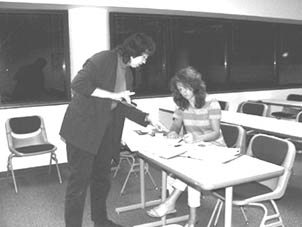Step inside the DAL perspective for a change

September 18, 2002
With the semester in full swing, typical students are feeling the pressures of college life. Now, imagine juggling the same stress along with full-time jobs and families.
Simpson’s Division of Adult Learning attracted more than 200 non-traditional students last year alone, each with their own special motivations for attending.
Deb Madison enrolled in Simpson after having spent time in the job market. She gained more experience with each position she had, but needed more education to get ahead. Finally, she was given the chance.
“I was at the right place at the right time. With my career path I was able to go back to school,” Madison said.
Madison didn’t make this decision on her own.
“With the encouragement of my spouse, I decided to come back and do it,” she said.
Now, with her job as an assistant to the governor, she shares her experiences with her classmates.
“It seems that adult students really bring real-world and business interaction to the classroom. Many students have good jobs, but with gaining academic skills they’re learning more.”
Tina Salisbury is another example of someone going through a dual-learning process with her work and education.
Salisbury, a crime scene investigator, landed a job she was interested in, but needed to take some more specific classes to keep up in the field.
Salisbury came to Simpson five years ago after hearing about the “outstanding criminal justice program,” she said. She recognizes that all students deal with balancing their schedules.
“I really don’t think there are many differences any more. Adult students may have families and jobs. But many students today also hold down jobs that require much of their time also. Both have their obligations.”
While outside jobs may slow students from keeping up with assignments, work often drives DAL students to take their classes seriously.
Some employers pay to have their employees go back to school, and that can sometimes affect the effort put forth by the student.
A good grade point average is usually needed, so many, according to Salisbury, “don’t just glide by.”
Salisbury says the advice she gives students is to stay focused on their school work, and not just get by with average grades, because many institutions today require higher and higher grade point averages.
A unique aspect of the DAL experience is the lifetimes portfolios that adult students can compile to qualify for credit hours. According to Madison, adult students present it in front of five professors. Madison said that this is something that she doesn’t think many adult students take advantage of, even though it gives them the opportunity to present their accomplishments up to that point.



